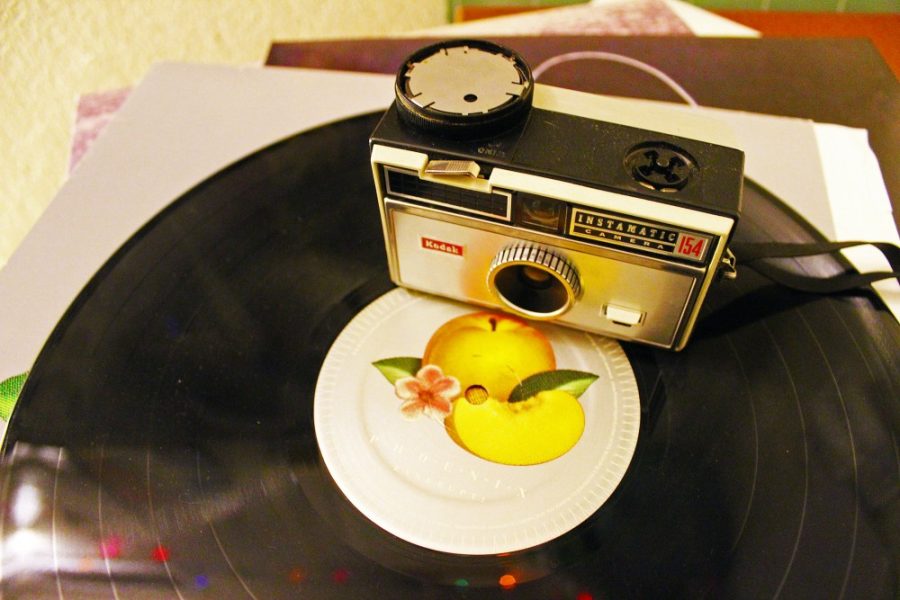The hipsters of the 2000s no longer have domain over the coolness of retro technology; the regular use of record players, polaroid cameras and old gaming consoles, among many other antiquated technologies, has made its way into the mainstream. But with a society so set on finding the next best gadgets and software, where does this popular resurgence in old technology come from?
Perhaps the most popular of these retro technologies are those that play recorded music.
According to a Fortune article from April of 2016, vinyl record sales are at a 28-year high.
Part of this is because of the popularity of the nationwide Record Store Day—which first took place in 2008—aimed to bring customers back into record stores to purchase and appreciate the old medium.
Of course, pop culture soon got hold of the hipster torch and vinyl records became ubiquitous in mainstream music and entertainment stores across the country.
While this trend is still on the rise, Tucson has had a quirky love for antique items and technology for quite some time. Just take a stroll down Fourth Avenue or drive around midtown and Tucson’s love for all things retro becomes apparent.
In addition to the many local record shops, such as Wooden Tooth Records and Old Paint Records, Tucson is home to a record label that only produces and sells its music on cassette tapes. The label, Baby Tooth, started producing and representing local talent in 2016.
RELATED: Wooden Tooth records finds a new home for music lovers in downtown Tucson
“The reason we started the label, in general, was that we wanted to help local bands release their music in a physical format,” said Jacob Sullivan, co-founder of Baby Tooth. “Anyone can put out an album digitally and share it that way, which is great, but as a musician, there is something really gratifying about having a physical object—be it a cassette, vinyl record or CD—that is a tangible result of your hard work in songwriting and recording.”
Sullivan said he and his co-founder Mark Addington decided to sell the labels’ music through cassettes because they are inexpensive to produce and support the long-lasting resilience of this outdated medium.
“I would say that there’s definitely a trendiness to retro technology, which is why a lot of people get into things like vinyl or even cassettes,” Sullivan said.
Whether it be from nostalgic or trendiness, Baby Tooth has found a welcoming embrace from the Tucson music community.
RELATED: Local artists to release albums Friday
Another local business, Stereo Hospital, has been a long time supporter of old technology.
Located inside of Metro Gnome Music at 4044 E. Speedway Blvd., this repair shop has repaired and sold retro music technology for 16 years.
“There’s still quite a bit of demand for analog stuff, especially people wanting to get back into their old devices,” said Hunter Barton, an associate at Stereo Hospital.
Stereo Hospital repairs anywhere from three to six stereos per day and the business has only seen an increase in demand by riding the tidal wave of old media nostalgia.
Like Addington, Barton said that a major draw to turntables is the different sound from digital audio.
Analog media might offer a preferable sound to some, but is this aesthetic preference the main reason why a record player sat at the top of so many teens’ Christmas lists this year?
Amazon.com currently has over 2,000 turntables for sale, and not to mention over 1 million vinyl records.
Despite its growing popularity, some young people aren’t fans of this newfound obsession—and consequent capitalization—of nostalgic technology.
“The majority of the appeal to retro tech stems from a natural instinct to embrace the cultural era of that of parents,” said Chris Rosenberg, a pre-business sophomore. “Seeing their nostalgic responses creates a sense of desire to reciprocate those feelings. Retro technologies go hand in hand with trends such as vintage fashion and style.”
Rosenberg said, while record players and polaroid cameras are cute and have novelty in their own right, they are ultimately inefficient in a time when we expect technology to work for us.
But with the potential for disarray on streaming sites, analog technology can be a reprieve from the ability to change a song, album or artist with the touch of a finger.
“I think the experience of listening to an album is hugely determined by how you’re listening to it,” Sullivan said. “You are forced to listen to the entire album, one side at a time, beginning to end. Most musicians put a huge amount of thought into the sequencing of tracks and how songs are arranged together, and with a cassette, you really get to hear the album as the artist intended.”
The entire experience of purchasing music seems to have become lost among the digitization of music; the liner notes, the album art and the part of the collection of a piece of music can disappear with digital music, according to Sullivan.
Regardless of the purpose for owning retro technology, continual use of it is bound to lead to a newfound appreciation and possibly a new aesthetic preference.
“Even if you get into records (or cassettes) because of the trendiness factor, you start to become addicted to the pleasure that comes from owning and appreciating music in these analog formats and become a part of the music lovers’ cult,” Sullivan said.









